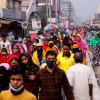How effective is online education in the current political situation?

Considering the country's volatile political situation and the consequent, sporadic school closures, a number of educational institutions have decided to operate online, and obviously, everyone has an opinion.
Online education was first offered through university websites in the 1980s, but it was not until the COVID-19 pandemic that the notion saw worldwide adoption and acceptance. It seemed to be the best solution in the wake of prolonged school closures thanks to a potentially lethal disease. It kept students in touch with education and allowed teachers to complete their academic year with some relief.
While in no way ideal, virtual education did manage to do something unprecedented. It gave the institutions of the country a perpetual set-up they could use whenever they faced unwarranted disruptions in the academic year.
The last few weeks in Bangladesh have been politically choppy. As candidates run their election campaigns, the country has seen sporadic acts of turbulence and a slowing down of public and private transport on the streets. Unwilling to compromise on student safety, yet equally disinclined to pause their lesson plans, schools have been relatively quick to react. With year-end examinations to get through within the month, institutions have already gone back to virtual classrooms, inviting students to join classes from the comfort and safety of their homes.
"It's been fairly easy to make the transition this time," informs Shama Mehjabeen, a Languages Teacher of a prominent English Medium school. "It's a blessing, of course, to be able to utilise the time we spend indoors to complete the midterm syllabus." The move, however, has not been met without criticism.
The problems being cited with regards to online classroom set-ups are not new. First on the list is internet connectivity. While most internet service providers in the city claim unbroken connectivity, the reality is hardly this smooth. Varying speeds have students and teachers lagging in class and this prevents both parties from concentrating fully. Shumi Selim, a counsellor at a prominent school in Dhaka, mentions, "When a student is finally opening up about a sensitive topic, and the internet glitches, it can become very awkward for both of us."
The online format of schooling requires students to have a laptop or a tablet to join classes and submit work on. For lower- and middle-class households, especially those with more than one school-going child, this can get costly. "I'm glad I have twins," sighs Shamina Akhter, a parent of two seven-year-olds first graders. "I wouldn't be able to afford the cost of two laptops if my kids belonged to different grades. Our kind of families simply cannot conceive of such a luxury!"
Early introduction to screen time interrupts the development of joint attention in a child, leaving them less likely to want to organise themselves or complete tasks. This is probably why children today have shorter and shorter attention spans compared to previous generations. Unfortunately, an online educational set-up adds to their screen time, and it probably goes without saying that some children simply refuse to concentrate when the teacher isn't physically close to them.
While a lot of this may seem discouraging, online education comes with some solid merits. Firstly, it is quite evident that institutions are genuinely concerned about their students' educational wellbeing. A prime example of this is the sheer willingness of the older generation of teachers to embrace technology so wholeheartedly.
Secondly, online education encourages learning outside of the conventional classroom environment, allowing self-motivated pupils to shine. "During COVID times, I had increased my typing speed quite a bit and the lessons I learned back then are continuing to help me now," shares Debashish Pal, an eighth-grader at an international school in Dhaka.
One of the most challenging things that schools have had to do in pandemic years is take half yearly and final examinations virtually. The lack of proximity from teachers increases the temptation in students to use unfair means to pass, and many pupils have, unfortunately, succumbed to the lure.
However, if one looks at the situation fairly, children have always tested their limits, even in physical classroom environments. As long as schools are confident that they have instilled the right principles in their students, the outliers should be few and far between. While online invigilation cannot guarantee that students are being their most ethical, it can be a test of character for the children, allowing them to learn a great life lesson. By taking the onus from teacher to pupil, this medium of study helps develop strength of character and encourage creativity in thought.
Times are changing and thanks to the existence of online set-ups, schools are no longer willing to disrupt their study plans for the year by keeping institutions shut. Despite the hitches, online set-ups help to get the job done, albeit a little more slowly.
The need for virtual education has, in many ways, forced the schools of the subcontinent to recognise what the west already knows- that teaching methods have always been fluid, and one need not take this transition to be any more or any less different than moving from slate to whiteboard. Considering the sort of advanced tech that is continuously being adopted in the corporate world, it was only a matter of time before the education industry caught up.

 For all latest news, follow The Daily Star's Google News channel.
For all latest news, follow The Daily Star's Google News channel. 







Comments